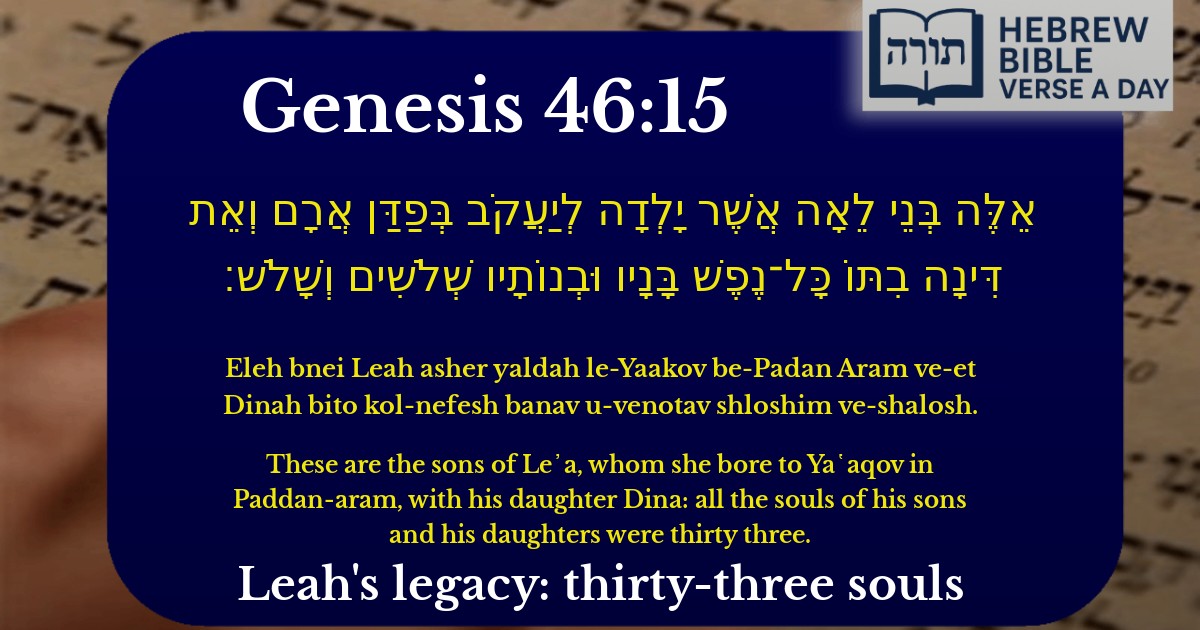Join Our Newsletter To Be Informed When New Videos Are Posted
Join the thousands of fellow Studends who rely on our videos to learn how to read the bible in Hebrew for free!
Hebrew Text
אֵלֶּה בְּנֵי לֵאָה אֲשֶׁר יָלְדָה לְיַעֲקֹב בְּפַדַּן אֲרָם וְאֵת דִּינָה בִתּוֹ כָּל־נֶפֶשׁ בָּנָיו וּבְנוֹתָיו שְׁלֹשִׁים וְשָׁלֹשׁ׃
English Translation
These are the sons of Le᾽a, whom she bore to Ya῾aqov in Paddan-aram, with his daughter Dina: all the souls of his sons and his daughters were thirty three.
Transliteration
Eleh bnei Leah asher yaldah le-Yaakov be-Padan Aram ve-et Dinah bito kol-nefesh banav u-venotav shloshim ve-shalosh.
Hebrew Leining Text
אֵ֣לֶּה <b>׀</b> בְּנֵ֣י לֵאָ֗ה אֲשֶׁ֨ר יָֽלְדָ֤ה לְיַעֲקֹב֙ בְּפַדַּ֣ן אֲרָ֔ם וְאֵ֖ת דִּינָ֣ה בִתּ֑וֹ כׇּל־נֶ֧פֶשׁ בָּנָ֛יו וּבְנוֹתָ֖יו שְׁלֹשִׁ֥ים וְשָׁלֹֽשׁ׃
אֵ֣לֶּה ׀ בְּנֵ֣י לֵאָ֗ה אֲשֶׁ֨ר יָֽלְדָ֤ה לְיַעֲקֹב֙ בְּפַדַּ֣ן אֲרָ֔ם וְאֵ֖ת דִּינָ֣ה בִתּ֑וֹ כׇּל־נֶ֧פֶשׁ בָּנָ֛יו וּבְנוֹתָ֖יו שְׁלֹשִׁ֥ים וְשָׁלֹֽשׁ׃
🎵 Listen to leining
Parasha Commentary
📚 Talmud Citations
This verse is not quoted in the Talmud.


The Sons of Leah in Paddan-Aram
The verse (Genesis 46:15) lists the descendants of Leah who accompanied Yaakov to Egypt, emphasizing their origin in Paddan-Aram. Rashi notes that the phrase "בְּפַדַּן אֲרָם" ("in Paddan-Aram") connects this lineage back to Leah's children born during Yaakov's sojourn with Lavan, reinforcing their covenantal identity as part of Bnei Yisrael.
Inclusion of Dinah
The verse specifically mentions "וְאֵת דִּינָה בִתּוֹ" ("and his daughter Dinah"), highlighting her as Leah's only recorded daughter. The Midrash (Bereishit Rabbah 80:1) explains that Dinah's separate mention underscores her significance, as she was born alongside Zevulun (Leah's sixth son) and was later central to the narrative of Shechem (Genesis 34). Ramban adds that her inclusion here reflects her role in the family's continuity despite the trials she endured.
The Count of Thirty-Three Souls
The total of "שְׁלֹשִׁים וְשָׁלֹשׁ" ("thirty-three") souls presents a discrepancy with earlier counts. Rashi resolves this by clarifying that the tally includes:
The Talmud (Bava Batra 123a) debates alternative counts, suggesting adjustments for figures like Yocheved (Moshe's mother, born at Egypt's border).
Leah's Legacy
The verse underscores Leah's foundational role in building Klal Yisrael. The Midrash (Tanchuma Vayechi 12) praises Leah for her righteousness, noting that her descendants—including kings, prophets, and Levi'im—fulfilled the divine promise of a vast nation. The emphasis on "כָּל־נֶפֶשׁ" ("all the souls") reflects the unity of her offspring as part of Yaakov's sacred household.